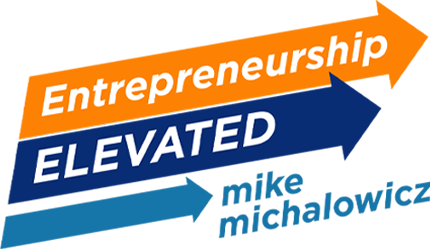In this interview, Mike interviews John Ruhlin, author and founder of GIFT∙OLOGY. John has been praised as a world-class gift marketer by people like Gary Vaynerchuk, Shep Hyken, Lewis Howes, John Lee Dumas, and has been featured on places such as Inc, Forbes, Fast Company, Fox News, and the New York Times.
But before GIFT∙OLOGY was featured everywhere (literally everywhere), John’s entrepreneurship journey started from humble beginnings. In his own words: “I grew up on a farm in Ohio, milking goats. Know this: nothing is more motivating than pulling teets at 5am in negative thousand degree weather. I needed out. …but how?”
MIKE: MOST PEOPLE DON’T THINK OF GIFTING AS A MARKETING CHANNEL. WHAT WOULD YOU SAY TO THAT?
Marketing is nothing more than starting, building, and keeping relationships. Gifting does all those things. Cynical me, of course, would smirk and tell the masses, “Keep thinking that. It gives the rest of us an unfair, ridiculously-large, competitive advantage.”
MIKE: HA. OK THEN! TELL US HOW TO THINK DIFFERENTLY ABOUT GIFTING.
Behind every business decision is a human being. Human beings are hard-wired to love (and reciprocate) great acts of kindness. Mike, think of it this way. There’s no ad campaign you can create that’ll emotionally anchor your audience the way a personalized gift will. There’s just not.
We’re all familiar with the law of reciprocity. Do nice things for others (with no ASK behind it) and people will do nice things for you. In 1985, Ethiopia sent $5,000 to Mexico after an 8.1 magnitude earthquake killed thousands. Why? Because 50 years earlier, Mexico went to bat for Ethiopia when Italy invaded. Humans are hard-wired to reciprocate kindness… without being asked.
MIKE: I’M NOT A GOOD GIFT GIVER. HOW DOES ONE GET STARTED WITH THIS?
Yes you are, Mike, and you know it. But I’ll humor your humility. MOST people say “I’m not a good gift giver.” I’m not either. But for a one-off gift, guys like us don’t need to be good gift givers. We need to be good listeners. And we need to be willing to try 25% harder than we’ve tried in the past.
Social media and the digital world make it easy to do research. There’s no excuse for you to know nothing about your dream targets. Enroll their inner circle to help you (spouses are my favorite, even if I’ve never met them). Look for clues in every interaction you have with these VIPs and, for gosh sakes, write things down.
But here’s a big key: Gift∙ologists (as I call my tribe) don’t focus on the WHAT as much as they focus on the WHO. When you gift the right people, you open yourself up to:
- Getting referrals without asking – because we always want to recommend those we love.
- Affair-proofing customer, client, and employee relationships. Forever.
- Differentiating ourselves as a brand – whether we’re a Fortune 500 company or a solopreneur.
MIKE: ON YOUR WEBSITE, I SEE THAT THE CHICAGO CLUBS AND OTHER PROFESSIONAL SPORTS TEAMS ARE YOUR CLIENTS. DO YOU HAVE TO HAVE ‘MADE IT’ IN ORDER TO IMPLEMENT STRATEGIC GIFTING?
Absolutely not. Strategic gifting is what will CAUSE YOU to ‘make it.’ When I was a Vector/Cutco sales rep (how I got my beginnings), I was a 23-year-old-kid sitting down with Fortune 500 CEOs. I had no right to be in that room. But I knew which gifts to avoid and I knew how to network up.
One high-powered executive even told me: “Umm… I was expecting somebody older. What are you here to do, kid?” And I looked him dead in the eye and said: “I’m here to teach your thousand sales reps to do exactly what I just did for you.”
You could actually see the lightbulb going off above his head. He became a client the same day. And also hired me to speak to his company.
MIKE: THAT’S PRETTY EXCEPTIONAL.
That’s the thing! It’s really not, though. It’s simple. NOT EASY. But simple. But most people don’t do it. They bring their experience of personal gifting to the world of business gifting. And it’s not the same at all.
MIKE: WHAT ARE THE DIFFERENCES?
For starters, people need to think “gifting-at-scale.” Most people think, “buy the same cheap gift for a hundred people.” OR they think, “buy one special thing for ONE person, based on their hobbies and interests.” When instead – they need to be thinking, “buy an exceptional gift for my top 20-40 relationships.” It can be and (in most cases) should be the same type of gift. A practical luxury, that they use every day.
MIKE: TELL ME MORE. WHAT GIFTS SHOULD MARKETERS BE BUYING?
GIFT∙OLOGYgive best-in-class artifacts. That means items your recipients would love-to-have but would never buy for themselves. Example: if you have five hundred bucks to spend on a business gift, don’t buy your recipient a kinda-nice watch. Gift them a handcrafted, hand-carved, personalized coffee mug. And no, you’re not going to put your name or company logo on it, because then your gift is about you.
Buying people gifts based on their hobbies almost always fails. Think about it. You’re entering a world you know nothing about, but your recipient knows everything about. You’re not going to succeed. Example: my business partner, Rod, is a cigar-aficionado. People learn this and buy him cigars. Most of which he would never smoke (I have no idea why) and windup in the garbage.
The first thing a Gift∙ologist receives when they sign up for my email list (shameless plug) is a TOP 10 list of the world’s worst gifts. Every single professional has purchased some of these: food, gift cards, money, alcohol, and other emotionless things that your competitors think are brilliant. And while we’re attacking the predictable? Gift randomly. Everyone expects something around Christmas. A Gift∙ologist will knock your socks off on a random Tuesday in February.
MIKE: AREN’T YOU WORRIED THAT THIS WILL COME ACROSS LIKE BRIBERY? ALMOST LIKE, “Ok. This person obviously needs something from me. What’s the catch?”
Everybody asks that. It’s every generous person’s number one fear.
Our tribe makes fun of those people – we call them “quid-pro-quo gifters.” They are the worst kind of people. “I’ll scratch your back if you scratch mine.” Look, dude, my back doesn’t itch. I see these folks all the time. Their gifting formula is “give something cheap and/or worthless and ask for something big.”
It’s the very opposite of what we teach: “Give something big and valuable. And ask for NOTHING.”
Transactional gifting is the stuff of over-dramatized political thrillers. So avoid any words in your handwritten note (yes, handwritten notes are a must) that insinuate you’re expecting anything in return.
“But where’s the ROI in that,” you ask? Just trust me. Or better yet – try it.
MIKE: OK, I’M CONVINCED. HOW DOES SOMEBODY GET STARTED WITH THEIR FIRST STRATEGIC GIFT?
You don’t have to go all-in. In fact, start small. But start. Buy one gift. Business leaders always ask about the budget. We recommend $250 per gift for a dozen reasons we won’t go into here.
If you’re currently marketing, move dollars over from a low-performing channel to a gifting test. Easy. Depending on your industry margins, you can make 30x ROI from a $3K-$5K campaign.
If you’re NOT currently marketing? Maybe you’re a solopreneur or just getting started. Step 1 is to make a gifting list of people who –if they were so inclined– could open the customer floodgates for your business.
(Last plug, I promise). If you want to get more, no-cost, education on the topic of strategic gifting, join our newsletter at TheGiversEdge.com.
The difference with gifting compared to other branding and marketing channels is that this makes you memorable. Your goal is to be gifting heirlooms. You are creating marketing artifacts that are too good to ever be thrown away.
Or you’re not. And you’re like everybody else.
GIFT∙OLOGY is the deep versus wide approach. It’s for people –like me and like YOU, Mike– that believe relationships are the number one asset any business leader can have.
Successful people aren’t generous because they’re wealthy. They’re wealthy because they’re generous. You, too, can attract the most (and best) attention by being the most generous version of yourself.
Be the type of leader that makes remarkable, unforgettable, impressions. Because it’s not the thought that counts. It’s the thoughtful thought that counts.











Wonderful advice, although being a beginning solopreneur, there won’t be any $250 gifts just yet! 😁